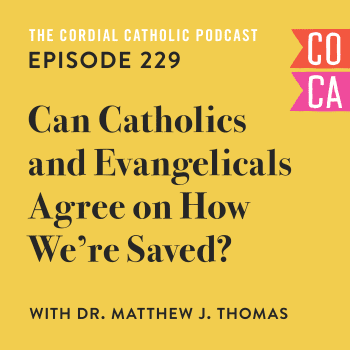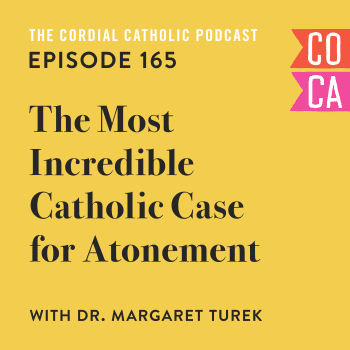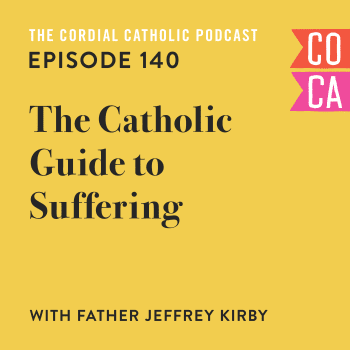
As a Christian of no real denominational or theological affiliation, I always struggled with Paul’s seemingly off-the-cuff remark in his epistle to the Colossians,
Now I rejoice in my sufferings for your sake, and in my flesh I do my share on behalf of His body, which is the church, in filling up what is lacking in Christ’s afflictions. (1:24; NASB)
What exactly did Paul mean when he implied that Jesus’ “afflictions” were lacking?
How did he make up for a lack anyway?
As an otherwise unaffiliated evangelical, one thing which set my heresy meter whirling like nothing else was the notion that I was somehow “earning” or “working towards” my own salvation. The thought that, somehow, I was sharing or filling up something that was lacking on the part of Jesus’ sacrifice was beyond abhorrent to me.
It was down right un-Christian.
Jesus’ sacrifice was once-and-for-all and I didn’t need to do anything to work that out, to “earn” my salvation, or add to it in any way, shape or form.
But then, what could Paul have meant?
Like most evangelicals, mine was a theology of piece meal, put together by reading from a selection of my favourite theologians of no particular tradition, scope, or school. A little J.I. Packer, some Dallas Willard and Eugene Peterson and, as I got a bit older, heavy on the N.T. Wright. My understanding of nuanced passages like Paul’s comment to the church at Colossae was highly fragmented, to say the least.
So for a long time, as a non-denominational Christian, I ignored difficult Scriptures like these.
I was satisfied that theologians much smarter than I had sufficiently wrestled passages like this to the ground and come to an adequate, evangelical understanding, based on the best plain text interpretation possible. (Although, suspiciously, I couldn’t find any mention of it anywhere.)
But I’m the sort of person inclined to lose sleep while on vacation if I know that, at home, I accidentally left my bed unmade so loose ends like Colossians 1:24 slowly undid my rather lazy attempt to papered them over. Eventually, not knowing exactly what Paul meant when he said we can add to Christ’s afflictions on the cross really started to get my goat. And I needed to know more.
As an evangelical, I could not explain what Paul meant by “filling up” what was lacking in Christ because we didn’t have a framework to begin to understand something so strange. For us, Christ was done on the cross and we simply needed to live a Christian life, ask for forgiveness when we’d done wrong, and try to keep our heads down.
I had no context for adding to Christ’s afflictions because I didn’t really have any cause to think about them.
But, for a number of complicated reasons, I became a Catholic. And came home.
On the subjects of salvation, grace, and Christ’s afflictions, the Catholic Church, over the last two thousand years, has had quite a bit to say.
The Catholic theology of salvation, it turns out, was largely what I’d held in my piece meal understanding as an evangelical. Jesus Christ, through his sacrifice on the cross, paid for our way into eternal life. We are saved, exclusively, through his sacrifice but we have to accept it willingly. As a Catholic, that means we can reject it too, if we turn away from Christ. Admittedly, something which never made a lot of sense to me as an evangelical was that I could accept Christ, murder a village of innocent women and children, and still be in Heaven the moment after I die.
It made sense to me, even then, that we’re able to turn away from God in the same way that we can turn to him in the first place.
As Catholics we don’t earn our salvation, as some may have come to believe, but we do play a particular part in it. We must, first of all, accept God’s free invitation of grace through baptism, confirmation, and the sacraments and then we must live in a way that embraces Christ.
Through living a Christian life, through receipt of the sacraments, through prayer and fasting and even through patient and holy suffering we slowly but surely conform our lives to Christ. Christ, in us, transforms us to be just like him: Christians; little Christs.
In the theology of the ancient Catholic Church this is what’s meant by our lives, this is our entire purpose: to slowly conform to Christ. And it was through a greater understanding of what the Church said about suffering that I came to, finally, unpack passage like that in Paul’s epistle to the Colossians.
What is lacking in Christ’s afflictions? Really, nothing.
But Paul wasn’t speaking exclusively about Christ. He was, as is clear from a second reading, speaking about Christ’s mystical body, the Church too,
Now I rejoice in my sufferings for your sake, and in my flesh I do my share on behalf of His body, which is the church, in filling up what is lacking in Christ’s afflictions. (1:24; NASB)
What is lacking in Christ’s afflictions, then, are the future sufferings of the Church. The sufferings of you and I, as little Christs.
St. John Chrysostom, writing nearly 1,300 years ago, observed that, “There is no want in the sufferings of Christ himself as head; but many sufferings are still wanting, or are still to come in his body, the Church, and his members, the faithful.”
It is in these sufferings that we can “fill up” anything lacking in Christ and I heard this best explained by a nun.
Sister Rosalind Moss, also known as Mother Miriam of the Lamb of God, is the foundress of the Daughters of Mary, Mother of Israel’s Hope apostolate and an incredible powerful witness to the power of God. When asked, in an interview, how she understood suffering and God’s grace she referred to Paul’s letter to the Colossians, the same versed I wrestled with, and unpacked it like this.
If we as parents were baking one day and our son or daughter came with a handful of sugar to sweeten the recipe we’d likely never dream of sending them away. Instead, we’d take their heartfelt offering and incorporate it into the recipe, even if it didn’t quite fit, we’d make it work.
We’d take their simple, humble act, and add it to our own efforts to make something good.
How much of a better parent, Mother Miriam asked, is God?
What is lacking in Christ’s afflictions? Well, nothing, apart from the future suffering of the Church. The suffering of you and I and everyone else in both the absolutely horrific and the incredibly mundane. And everything in between. In the holy suffering of the ancient imprisoned Christians, the martyrs and missionaries—in the tiny sufferings of that vexing day job, the annoying co-worker, the terrible flu you’ve endured for days.
And, of course, Christ’s once-and-for-all sacrifice covers over these things. He is enough. But as we live our lives and transform ourselves into little Christs—with his help—he also won’t reject our “additions” to what he’s done.
Likewise, our efforts to help the poor, our work at the food bank or the shelter, our giving, our helping out—our “good works” won’t go nowhere.
The good things we do and the patient sufferings we endure are meaningful because Christ takes them and adds them to what he’s already done like a kind mother adding a handful of sugar to an ancient family recipe. Christ wants our good and our suffering; he wants to transform our lived lives, wants to add it all to what he’s making and what he’s doing and for the salvation of the whole world. And that’s a very good thing.
What’s lacking, in the end, from Christ’s afflictions are our own, and God wants us to add them, too.












